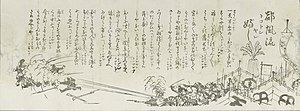Miyasan, Miyasan
 The songs lyrics, c. 1868 | |
| Lyrics | Shinagawa Yajirō, c. 1868 |
|---|---|
| Published | c. 1868 |
"Miyasan, Miyasan" (宮さん宮さん), also known as "Tonyare-Bushi", was a loyalist song, popular during the Boshin War.[1] It is also Japan's oldest military song.[2][3]
Overview
[edit]The lyrics refer to Prince Arisugawa Taruhito, or "Miya-san" in the song.[4][5] He was an influential figure in the Meiji Restoration.[6][7] He was also the Grand Governor of the Eastern Expedition during the war.[8] The lyrics represent the spirits of the new government forces[8] which was the military forces belonging to the Emperor and the Imperial Court.
In January 1868, the new government forces, formed from the three domains of the Satsuma, Choshu, and Tosa clans fought and won the Battle of Toba-Fushimi against the old shogunate forces.[7] The following month, the new government's president, Prince Arisugawa Taruhito, also serving as the Grand Governor-General of the Eastern Expedition, was given a brocaded flag and a ceremonial sword by Emperor Meiji, and began marching along the Tokaido Highway.[7] All these events are mentioned in the songs lyrics.
Lyrics
[edit]宮さん宮さんお馬の前に
ヒラヒラするのは何じやいな トコトンヤレ、トンヤレナ あれは朝敵征伐せよとの 錦の御旗じや知らないか トコトンヤレ、トンヤレナ
一天萬乗の帝王に 手向ひすろ奴を トコトンヤレ、トンヤレナ 覗ひ外さず、 どんどん撃ち出す薩長土 トコトンヤレ、トンヤレナ
伏見、鳥羽、淀 橋本、葛葉の戰は トコトンヤレ、トンヤレナ 薩土長肥の 薩土長肥の 合ふたる手際ぢやないかいな トコトンヤレ、トンヤレナ
音に聞えし關東武士 どつちへ逃げたと問ふたれば トコトンヤレ、トンヤレナ 城も氣慨も 捨てて吾妻へ逃げたげな トコトンヤレ、トンヤレナ
國を迫ふのも人を殺すも 誰も本意ぢやないけれど トコトンヤレ、トンヤレナ 薩長土の先手に 手向ひする故に トコトンヤレ、トンヤレナ
雨の降るよな 鐵砲の玉の來る中に トコトンヤレ、トンヤレナ 命惜まず魁するのも 皆お主の為め故ぢや
トコトンヤレ、トンヤレナ
Miya san miya san o uma no mae ni
Hirahira suru no wa nan jai na Tokoton'yare ton'yarena
Are wa chōteki seibatsuseyo to no Nishiki no mihata ja shiranai ka Tokoton'yare ton'yarena
Itten banjō no itten banjō no Mikado ni temukai suru yatsu o Tokoton'yare ton'yarena
Nerai hazusazu nerai hazusazu Dondon uchidasu satchōdo Tokoton'yare ton'yarena
Oto ni kikoe shi Kantō samurai Dotchi e nigeta to tou tareba Tokoton'yare ton'yarena
Shiro mo kigai mo shiro mo kigai mo Sutete azuma e nigetage na Tokoton'yare ton'yarena
Kuni o ou no mo hito o korosu mo Dare mo honki ja nai keredo Tokoton'yare ton'yarena
Satchō Doi no satchō Doi no Sakite ni temukai suru yueni
Tokoton'yare Ton'yarena
My Lord, my Lord, what is that?
Fluttering In front of the horse Go all the way, all the way.
That means "Conquer the enemies" Don't you know about "The Brocade Flag"? Go all the way, all the way.
To the enemy who‘re going against The Mikado of [the] whole realm Go all the way, all the way.
Satsuma, Choshu, Tosa don't miss That target and keep firing Go all the way, all the way. The well known Kanto samurais When I ask which way they ran Go all the way, all the way.
They abandoned their castle and spirit Then fled to Azuma, I heard Go all the way, all the way.
Even nobody really mean it Kicking out them or killing people Go all the way, all the way
'Cos they oppose the advance party Of Satsuma, Choshu, Tosa, and Hizen
Go all the way, all the way.
References
[edit]- ^ "SHINAGAWA Yajiro | Portraits of Modern Japanese Historical Figures | National Diet Library, Japan". Portraits of Modern Japanese Historical Figures. Retrieved 2024-12-26.
- ^ 卜田隆嗣「軍歌」『日本大百科全書 7』小学館、1986年1月1日 初版第一刷発行、ISBN 4-09-526007-6、786頁。
- ^ 山住正己「軍歌」『世界大百科事典 8』平凡社、2007年9月1日 改訂新版発行、370~371頁。
- ^ Sheldon, Charles D. (February 1974). "Boshin sensō (The Boshin War.) By Haracuchi Kiyoshi. Tokyo: Hanawa Shobō, 1963. 269 pp. ¥460. - Boshin sensōshi (A History of the Boshin War.) By Hirao Michio. Tokyo: Misaki Shobō, 1971. 229 pp. ¥ 1,500". The Journal of Asian Studies. 33 (2): 314–316. doi:10.2307/2052202. ISSN 0021-9118.
- ^ "About Miyasan (Tonyare-Bushi)". www.daisyfield.com. Retrieved 2024-12-26.
- ^ Dupuy, Trevor N. (Trevor Nevitt) (1992). The encyclopedia of military biography. Internet Archive. London : I.B. Tauris. ISBN 978-1-85043-569-3.
- ^ a b c Keene, Donald (2002). Emperor of Japan : Meiji and His world, 1852-1912. Internet Archive. New York : Columbia University Press. ISBN 978-0-231-12340-2.
- ^ a b "Wayback Machine" (PDF). ymonjo.ysn21.jp. Archived from the original (PDF) on 2015-04-02. Retrieved 2024-12-26.
- ^ a b "Japanese Military & Patriotic Songs - 宮さん宮さん (Miya san miya san) (Transliteration #2)". lyricstranslate.com. Retrieved 2024-12-26.
- ^ a b "miyakoharumi's "miyasanmiyasan" lyrics page". www.uta-net.com. Retrieved 2024-12-26.
- ^ "Japanese Military & Patriotic Songs - 宮さん宮さん (Miya san miya san) (English translation #2)". lyricstranslate.com. Retrieved 2024-12-26.
